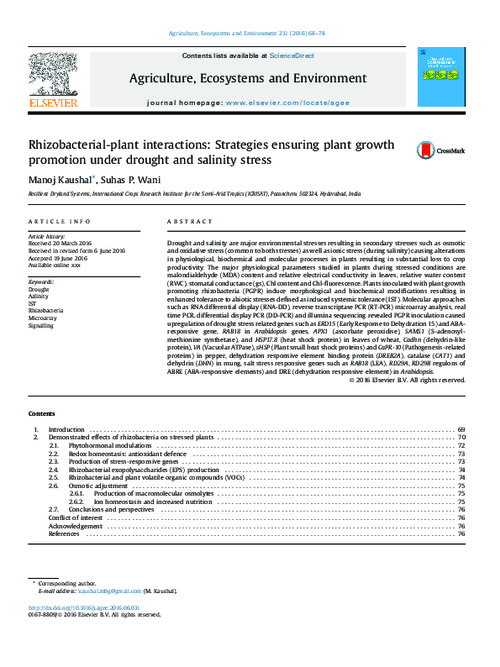Rhizobacterial-plant interactions: Strategies ensuring plant growth promotion under drought and salinity stress
Abstract
Drought and salinity are major environmental stresses resulting in secondary stresses such as osmotic
and oxidative stress (common to both stresses) as well as ionic stress (during salinity) causing alterations
in physiological, biochemical and molecular processes in plants resulting in substantial loss to crop
productivity. The major physiological parameters studied in plants during stressed conditions are
malondialdehyde (MDA) content and relative electrical conductivity in leaves, relative water content
(RWC), stomatal conductance (gs), Chl content and Chl-fluorescence. Plants inoculated with plant growth
promoting rhizobacteria (PGPR) induce morphological and biochemical modifications resulting in
enhanced tolerance to abiotic stresses defined as induced systemic tolerance (IST). Molecular approaches
such as RNA differential display (RNA-DD), reverse transcriptase PCR (RT-PCR) microarray analysis, real
time PCR, differential display PCR (DD-PCR) and illumina sequencing revealed PGPR inoculation caused
upregulation of drought stress related genes such as ERD15 (Early Response to Dehydration 15) and ABAresponsive
gene, RAB18 in Arabidopsis genes, APX1 (ascorbate peroxidise), SAMS1 (S-adenosylmethionine
synthetase), and HSP17.8 (heat shock protein) in leaves of wheat, Cadhn (dehydrin-like
protein), VA (Vacuolar ATPase), sHSP (Plant small heat shock proteins) and CaPR-10 (Pathogenesis-related
proteins) in pepper, dehydration responsive element binding protein (DREB2A), catalase (CAT1) and
dehydrin (DHN) in mung, salt stress responsive genes such as RAB18 (LEA), RD29A, RD29B regulons of
ABRE (ABA-responsive elements) and DRE (dehydration responsive element) in Arabidopsis

